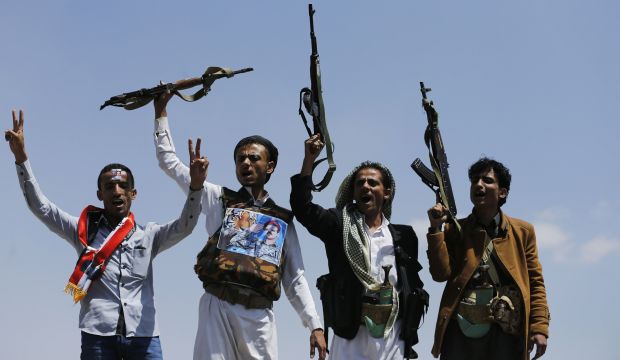
Supporters of Ahmed Ali Abdullah Saleh, the son of Yemen’s former President Ali Abdullah Saleh, raise their rifles as they demonstrate in Sana’a, on March 10, 2015. (Reuters/Khaled Abdullah)
Sana’a, Asharq Al-Awsat—Yemen’s political factions on Monday welcomed calls for Riyadh to host talks aimed at reaching consensus over the crisis that threatens to plunge the country into civil war.
Saudi Arabia on Monday responded to a call from President Abd Rabbuh Mansur Hadi to host talks between Yemeni political factions after previous negotiations collapsed over the refusal of the Houthi movement to release key government officials, including the Prime Minister Khaled Bahah, who remain under virtual house arrest in Sana’a.
Speaking to Asharq Al-Awsat on the condition of anonymity, an Aden government source said President Hadi’s office is reaching out to all Yemen’s political factions, including the Houthis, in an attempt to revive the talks under the auspices of the Gulf Cooperation Council (GCC) in the Saudi capital Riyadh.
“Like other political factions in Yemen, the Houthis have the right to vote. They do not have more privileges yet at the same time they are not less privileged and we hope they understand this,” the source said.
The Houthis last month announced a “constitutional declaration” following their takeover of the capital Sana’a, while holding Hadi, Bahah and other officials captive and forcing them to resign—essentially handing over the reins of power to the Shi’ite movement.
In a statement issued on Monday, the movement voiced its rejection of the talks.
“There is no justification for moving the talks outside the country and neither does the outgoing president have the right to move the talks elsewhere given that he lost legitimacy when he willingly submitted his resignation,” Ali Al-Qahoum, a member of the Houthi politburo, said in the statement.
The Houthi official also accused Hadi of leading a “conspiracy” against Yemen and seeking to destabilize the country.
Meanwhile, Mohammed Ali Marem, an adviser to Hadi, told Asharq Al-Awsat that some GCC member states will be coordinating with all political factions in Yemen on a solution to the crisis.
He said the member states, which he declined to name, would seek a solution in line with the GCC initiative—which oversaw former president Ali Abdullah Saleh’s exit from power in 2011 and the restructuring of the military—as well as the outcomes of the National Dialogue Conference, which in January 2014 laid down the framework for Yemen’s political transition.
In addition to Gulf states, Russia would also be involved in the process and would guarantee Houthi participation at the Riyadh talks, Marem said. “[Moscow] will play a role in reuniting Yemenis through its ties with Iran and the Houthis.”
The steps being taken by Hadi aim to end the Houthi coup without resorting to force and bloodletting, he maintained. He added that Hadi has so far refused to use the authority he has over the Defense Ministry to end the Houthi insurgency by using force.
Meanwhile, the ruling General People’s Congress (GPC) party, led by former president Saleh, said it welcomed “in principle” Riyadh’s offer to host the talks.
Saleh and the GPC have been accused of using their aides in the country’s military and security establishments to ease the Houthi advance across Sana’a and other regions of the country.
In comments to Asharq Al-Awsat, Ali Al-Makdishi, a senior GPC member, said his party does not have any negative feelings towards the GCC, maintaining that the party’s General Authority will meet soon to determine whether or not it will take part in the Riyadh talks.
The GPC will likely vote in favor of attending the talks, he said.
The Islamist Al-Islah party agreed to attend the talks. In a statement carried on the party’s website, spokesman Saeed Shamsan welcomed Riyadh’s willingness to hold the talks.
The Saudi response expresses the commitment of the Kingdom and the other GCC member states to maintaining the stability and unity of Yemen, the statement said.
Yemen’s main southern secessionist group, the Al-Hirak movement, also welcomed the Riyadh talks. Mohammed Halboub, an Al-Hirak member, said: “Yemen’s parties from across the spectrum have started holding quick meetings to update their representatives on the forthcoming talks in Saudi Arabia before consulting with the presidential office, which will represent President Hadi.”
Fahd Al-Zayabi contributed reporting from Riyadh. Mohammed Al-Ayed contributed reporting from Jeddah.
